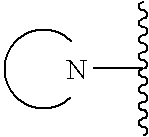Cb1 modulator compounds
a modulator compound and cb1 technology, applied in the field of cb1 modulator compounds, can solve the problems of overeating, psychosis, hypotherimia, memory loss,
- Summary
- Abstract
- Description
- Claims
- Application Information
AI Technical Summary
Benefits of technology
Problems solved by technology
Method used
Image
Examples
preparation 1
3-(6-Methoxy-cyclohex-1-enyl)-1H-indole
[0215]
[0216]Add 5 ml dry MeOH to a flask under N2 containing indole (1 g, 8.5 mmol, 8.5 eq) and potassium hydroxide (202 mg, 3.59 mmol, 1 eq). Add to this solution 2-Methoxy-cyclohexanone (834 mg, 6.5 mmol, 6.5 eq). Heat reaction to 63° C. for 18 hours. Cool reaction and purify crude material by silica gel chromatography to give 442 mg (30% yield) of 3-(6-Methoxy-cyclohex-1-enyl)-1H-indole as a waxy yellow solid. Mass Spectrum (m / e): 228.02 (MH+).
preparation 2
3-(2-Methoxy-cyclohexyl)-1H-indole
[0217]
[0218]Treat 3-(6-methoxy-cyclohex-1-enyl)-1H-indole (200 mg, 0.879 mmol) with 10% Pd / C (40 mg) in EtOAc under atmospheric hydrogenation conditions for 1.5 hours. Filter resulting solution over Celite to remove catalyst. Concentrate crude on rotovap and purify on silica gel chromatography to give 3-(2-Methoxy-cyclohexyl)-1H-indole (127 mg, 63% yield). Mass Spectrum (m / e): 230.03 (MH+), 228.14 (M−).
preparation 3
3-(1H-Indol-3-yl)-cyclopentanone
[0219]
[0220]Conduct reaction according to literature procedure (JOC, vol 67, 2002, pg 3700-3704) to give final 3-(1H-Indol-3-yl)-cyclopentanone (1.38 g, 81% yield) as a light pink solid. Mass Spectrum (m / e): 199.99 (MH+).
PUM
 Login to View More
Login to View More Abstract
Description
Claims
Application Information
 Login to View More
Login to View More - R&D
- Intellectual Property
- Life Sciences
- Materials
- Tech Scout
- Unparalleled Data Quality
- Higher Quality Content
- 60% Fewer Hallucinations
Browse by: Latest US Patents, China's latest patents, Technical Efficacy Thesaurus, Application Domain, Technology Topic, Popular Technical Reports.
© 2025 PatSnap. All rights reserved.Legal|Privacy policy|Modern Slavery Act Transparency Statement|Sitemap|About US| Contact US: help@patsnap.com



